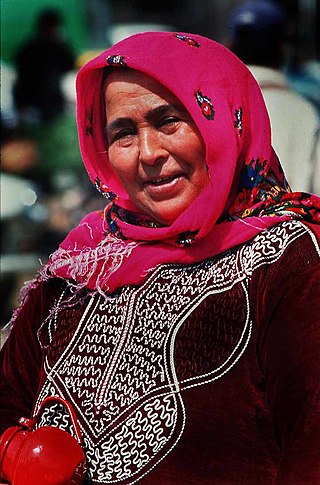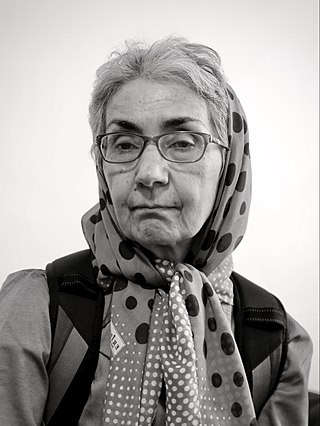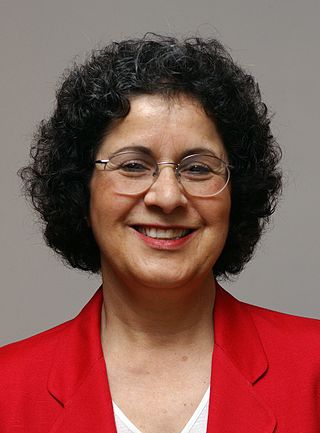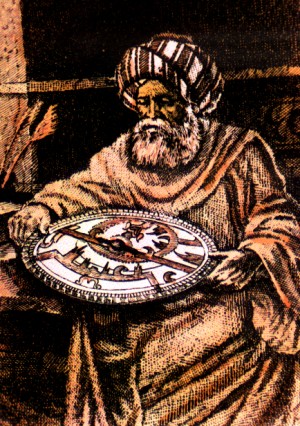Related Research Articles
Sharia is a body of religious law that forms a part of the Islamic tradition based on scriptures of Islam, particularly the Quran and hadith. In Arabic, the term sharīʿah refers to God's immutable divine law and this referencing is contrasted with fiqh, which refers to its interpretations by Islamic scholars. Fiqh, practical application side of sharia in a sense, was elaborated over the centuries by legal opinions issued by qualified jurists and sharia has never been the sole valid legal system in Islam historically; it has always been used alongside customary law from the beginning, and applied in courts by ruler-appointed judges, integrated with various economic, criminal and administrative laws issued by Muslim rulers.

In modern usage, hijab generally refers to various head coverings conventionally worn by many Muslim women. It is similar to the tichel or snood worn by Orthodox Jewish women, certain headcoverings worn by some Christian women, such as the mantilla, apostolnik and wimple, and the dupatta worn by many Hindu and Sikh women. Whilst a hijab can come in many forms, it often specifically refers to a scarf wrapped around the head, covering the hair, neck and ears but leaving the face visible. The use of the hijab has been on the rise worldwide since the 1970s and is viewed by many Muslims as expressing modesty and faith; it has also been worn for purposes of adornment. There is a consensus among Islamic religious scholars that covering the head is either required or preferred, though some Muslim scholars and activists point out that it is not mandated.
Islamic studies refers to the academic study of Islam, and generally to academic multidisciplinary "studies" programs—programs similar to others that focus on the history, texts and theologies of other religious traditions, such as Eastern Christian studies or Jewish studies but also fields such as —where scholars from diverse disciplines participate and exchange ideas pertaining to the particular field of study.

The Al-Azhar University is a public university in Cairo, Egypt. Associated with Al-Azhar Al-Sharif in Islamic Cairo, it is Egypt's oldest degree-granting university and is known as one of the most prestigious universities for Islamic learning. In addition to higher education, Al-Azhar oversees a national network of schools with approximately two million students. As of 1996, over 4,000 teaching institutes in Egypt were affiliated with the university.
Encyclopædia Iranica is a project whose goal is to create a comprehensive and authoritative English-language encyclopedia about the history, culture, and civilization of Iranian peoples from prehistory to modern times.

Islam is a minority faith in Thailand, with statistics suggesting 4.9% of the population are Muslim. Figures as high as 5% of Thailand's population have also been mentioned. A 2023 Pew Research Center survey gave 7%. Thai Muslims are the largest religious minority in the country.
Sexuality in Islam contains a wide range of views and laws, which are largely predicated on the Quran, and the sayings attributed to Muhammad (hadith) and the rulings of religious leaders (fatwa) confining sexual activity to marital relationships between men and women. Sexual jurisprudence and marital jurisprudence are the codifications of Islamic scholarly perspectives and rulings on sexuality, which both in turn also contain components of Islamic family jurisprudence, Islamic marital jurisprudence, hygienical, criminal and bioethical jurisprudence. All instructions regarding sex in Islam are considered parts of, firstly, Taqwa or obedience and secondly, Iman or faithfulness to God. Sensitivity to gender difference and modesty outside of marriage can be seen in current prominent aspects of Muslim cultures, such as interpretations of Islamic dress and degrees of gender segregation. Islamic marital jurisprudence allows Muslim men to be married to multiple women.

The Encyclopaedia of Islam (EI) is a reference work that focuses on the academic study of Islam. It is published by Brill and provides information on various aspects of Islam and the Islamic world. It is considered to be the standard reference work in the field of Islamic studies. The first edition was published in 1913–1938, the second in 1954–2005, and the third was begun in 2007.
Usha Sanyal is an Indian scholar and historian of Islam specializing in the Barelvi movement. She was a visiting assistant professor of history at Wingate University in North Carolina.

The experiences of Muslim women vary widely between and within different societies. At the same time, their adherence to Islam is a shared factor that affects their lives to a varying degree and gives them a common identity that may serve to bridge the wide cultural, social, and economic differences between them.

Islam is an Abrahamic monotheistic religion centered on the Quran and the teachings of Muhammad, the religion's founder. Adherents of Islam are called Muslims, who are estimated to number approximately 1.9 billion worldwide and are the world's second-largest religious population after Christians.
Saba Mahmood (1961–2018) was professor of anthropology at the University of California, Berkeley. At Berkeley, she was also affiliated with the Center for Middle Eastern Studies, Institute for South Asia Studies, and the Program in Critical Theory. Her scholarly work straddled debates in anthropology and political theory, with a focus on Muslim majority societies of the Middle East and South Asia. Mahmood made major theoretical contributions to rethinking the relationship between ethics and politics, religion and secularism, freedom and submission, and reason and embodiment. Influenced by the work of Talal Asad, she wrote on issues of gender, religious politics, secularism, and Muslim and non-Muslim relations in the Middle East.

The topic of Islam and children includes Islamic principles of child development, the rights of children in Islam, the duties of children towards their parents, and the rights of parents over their children, both biological and foster children. Also discussed are some of the differences regarding rights with respect to different schools of thought.
Sajida S. Alvi is an academic of Pakistani origin in Canada. She is a historian of Islam in South Asia and was the inaugural appointment to the chair in Urdu Language and Culture at the Institute of Islamic Studies from September 1987 until her retirement in June 2010.

Afsaneh Najmabadi is an Iranian-born American historian, gender theorist, archivist, and educator. She is the Francis Lee Higginson Professor of History and of Studies of Women, Gender, and Sexuality at Harvard University.
Aisha bint Abi Bakr was Islamic prophet Muhammad's third and youngest wife.

Suad Joseph received her doctorate in Anthropology from Columbia University in 1975. Dr. Joseph is Professor of Anthropology and Women and Gender Studies at the University of California, Davis and in 2009 was President of the Middle East Studies Association of North America. Her research addresses issues of gender; families, children, and youth; sociology of the family; and selfhood, citizenship, and the state in the Middle East, with a focus on her native Lebanon. Her earlier work focused on the politicization of religion in Lebanon. Joseph is the founder of the Middle East Research Group in Anthropology, the founder and coordinator of the Arab Families Working Group, the founder of the Association for Middle East Women's Studies, the general editor of the Encyclopedia of Women and Islamic Cultures, and the founding director of the Middle East/South Asian Studies Program at the University of California at Davis. She is also the founder and facilitator of a six-university consortium of the American University of Beirut, American University in Cairo, Lebanese American University, University of California at Davis, and Birzeit University Consortium.
Menstruation in Islam relates to various purity related restrictions in Islamic jurisprudence. The ḥaiḍ is the religious state of menstruation in Islam. The Qur'an makes specific mention of menstruation in Quran 2:222 which instructs:
And they ask you about menstruation. Say, "It is haram, so keep away from wives during menstruation. And do not approach them until they are pure. And when they have purified themselves, then come to them from where Allāh has ordained for you. Indeed, Allāh loves those who are constantly repentant and loves those who purify themselves.

Arab studies or Arabic studies is an academic discipline centered on the study of Arabs and Arab World. It consists of several disciplines such as anthropology, sociology, linguistics, historiography, archaeology, cultural studies, economics, geography, international relations, law, literature, philosophy, psychology, political science, and public administration. The field draws from old Arabic chronicles, records and oral literature, in addition to written accounts and traditions about Arabs from explorers and geographers in the Arab World.
Education has played a central role in Islam since the beginnings of the religion, owing in part to the centrality of scripture and its study in the Islamic tradition. Before the modern era, education would begin at a young age with study of Arabic and the Quran. For the first few centuries of Islam, educational settings were entirely informal, but beginning in the 11th and 12th centuries, the ruling elites began to establish institutions of higher religious learning known as madrasas in an effort to secure support and cooperation of the ulema. Madrasas soon multiplied throughout the Islamic world, which helped to spread Islamic learning beyond urban centers and to unite diverse Islamic communities in a shared cultural project. Madrasas were devoted principally to study of Islamic law, but they also offered other subjects such as theology, medicine, and mathematics. Muslims historically distinguished disciplines inherited from pre-Islamic civilizations, such as philosophy and medicine, which they called "sciences of the ancients" or "rational sciences", from Islamic religious sciences. Sciences of the former type flourished for several centuries, and their transmission formed part of the educational framework in classical and medieval Islam. In some cases, they were supported by institutions such as the House of Wisdom in Baghdad, but more often they were transmitted informally from teacher to student.
References
- ↑ "WLUML". Women Living under Muslim Laws. WLUML. Archived from the original on November 19, 2018. Retrieved March 16, 2012.
- ↑ Maira, Sunaina (October 2004). "Astutely Conceptualized: Interdisciplinary, Transhistorical, and Transnational". H-Net. Retrieved March 16, 2012.
- 1 2 "Encyclopedia of Women & Islamic Cultures" . Retrieved 2007-12-10.
- ↑ "Rethinking Arab Women as 'Subjects'". UCLA Center for Near Eastern Studies. Retrieved March 16, 2012.
- 1 2 "Women and Islamic Cultures: an ambitious academic project - Interview with Suad Joseph". Religioscope. Retrieved March 16, 2012.
- ↑ "Women and Islamic Cultures: An ambitious academic project – Interview with Suad Joseph".